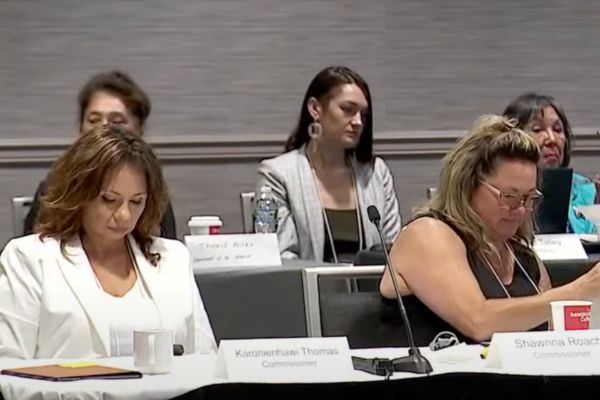
- Details
- By Elyse Wild
MINNEAPOLIS — Federal officials hosted a public hearing in Minneapolis this week as part of an ongoing government effort to address the Missing and Murdered Indigenous People (MMIP) crisis.
The session on Tuesday was the fourth of seven scheduled field hearings hosted by the Departments of Interior and Justice to implement the Not Invisible Act, a 2020 law to combat the MMIP epidemic. The field hearings allow the Not Invisible Act Commission — created in 2020 to represent tribal leaders, service providers, law enforcement and survivors— to hear directly from tribal communities impacted by the crisis. Testimonies gathered at the hearings will be used to inform a final report and recommendations to improve intergovernmental coordination and establish best practices for solving MMIP cases and supporting affected communities.
CBS News Minnesota reported that Tuesday’s hearing was emotional as Native American community members shared their experiences of losing a loved one to violence — and the subsequent apathy they felt from the criminal justice system.
Melissa Pamp, whose daughter died three years ago after a fatal stabbing, spoke to the difficulty of getting her daughter’s case investigated.
Community members who spoke at the hearing said they would like to see collaborative training between law enforcement, as well as trauma-informed, Native liaisons on tribal grounds to investigate violent crimes.
“I felt like I was a lead investigator,” Pamp said. “There’s a disconnect between law enforcement and tribal communities.”
Minnesota Lieutenant Governor Peggy Flanagan, an enrolled member of the White Earth Band of Ojibwe, also addressed the group at Tuesday’s hearing.
“There isn’t a single solution to this problem, but there is an urgent and critical need for all of us to work together in whatever area we have as our expertise,” Flanagan said. “So we can create a future where all of our communities are safe and we’ll be able to give some sense of closure to loved ones who’ve lost family members.”
As well, U.S. Attorney for Minnesota Andrew Luger announced at Tuesday’s hearing that his office has created a new division focusing on closing MMIP cases. Five newly hired attorneys will staff the new division. Luger said the division will be the first Indian Country section in the U.S. Attorney’s Office that works solely on Indian Country cases.
“For decades, United States attorneys have talked about adding lawyers to our Indian Country work, including work on [missing and murdered Indigenous person] cases and issues of violence against women and children, but we simply have not had the resources to do so,” Luger said.
While Native Americans make up 1 percent of Minnesota’s population, 9 percent of women and girls murdered in the state from 2010-2019 were Native. According to a report by the Urban Indian Health Institute, Minnesota has one of the highest numbers of MMIP cases in the nation.
This year's remaining Not Invisible Act Commission field hearings will be held in Northern California, Albuquerque and Billings, Mont.
More Stories Like This
Native News Weekly (August 25, 2024): D.C. BriefsUS Presidents in Their Own Words Concerning American Indians
Next on Native Bidaské: Preserving Indian Health with A.C. Locklear
Hozhonigo Institute Helps Drive $34.5M in Grant Pipeline for Tribal Communities
Torres, LaMalfa Lead Push to Safeguard Culturally Important Tribal Seed Varieties
Help us defend tribal sovereignty.
At Native News Online, our mission is rooted in telling the stories that strengthen sovereignty and uplift Indigenous voices — not just at year’s end, but every single day.
Because of your generosity last year, we were able to keep our reporters on the ground in tribal communities, at national gatherings and in the halls of Congress — covering the issues that matter most to Indian Country: sovereignty, culture, education, health and economic opportunity.
That support sustained us through a tough year in 2025. Now, as we look to the year ahead, we need your help right now to ensure warrior journalism remains strong — reporting that defends tribal sovereignty, amplifies Native truth, and holds power accountable.
 The stakes couldn't be higher. Your support keeps Native voices heard, Native stories told and Native sovereignty defended.
The stakes couldn't be higher. Your support keeps Native voices heard, Native stories told and Native sovereignty defended.
Stand with Warrior Journalism today.
Levi Rickert (Potawatomi), Editor & Publisher

